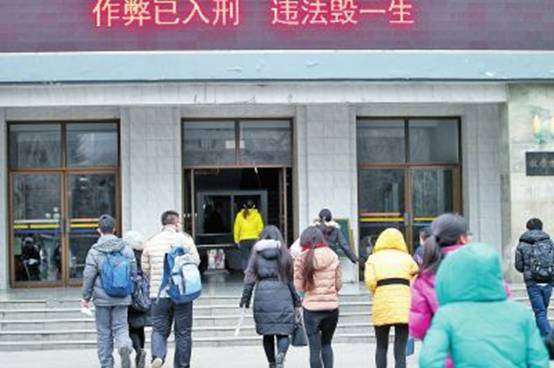当前位置: Language Tips> 新闻热词> Society Hot Word 社会
今年被媒体称为“最严”考试年,《刑法修正案(九)》于今年11月1日实施后,“作弊入刑”成为今年考研的各方关注焦点。尽管有“作弊入刑”的杀手锏,国家级考试中依然曝出泄题事件。

12月26日,“史上最严”考研拉开大幕。
请看《中国日报》的报道:
According to the ninth amendment to the Criminal Law that took effect on Nov 1, cheating in national examinations, such as the national college entrance examination and national postgraduate entrance examination, is criminal behavior, which can result in a sentence of up to seven years imprisonment if it is a serious violation.
根据11月1日开始施行的《刑法修正案(9)》,在国家级考试如高考和全国研究生入学考试中作弊是犯罪行为,情节严重的最高可处七年有期徒刑。
“作弊入刑”(make cheating in national exams a crime)后,今年被称为“最严”考试年。《刑法修正案(九)》明确组织作弊(organize cheating)、提供作弊器材(provide equipment or help for cheating)、非法出售或提供试题答案(illegally sell exam questions and answers)、代考替考(take tests for somebody else)等4类行为最高可判处七年有期徒刑(a sentence of up to seven years imprisonment)。
今年的研究生考试是修正案施行以来的首个国家级考试,也被称为“史上最严考研”(the strictest postgraduate entrance examination ever)。但是,28日就有媒体曝光出考研泄题事件。
目前教育部已向公安机关报案,等待进一步调查。教育部表示,考试作弊是犯罪行为,它严重扰乱了考试秩序(seriously disrupts exam order),破坏了教育的公平性(undermines the fairness of education),将积极配合警方调查。
(中国日报网英语点津 刘秀红)
上一篇 : 我国土地“荒漠化”问题有所改善
下一篇 : “毒保姆”暴露家政业乱象
关注和订阅


电话:8610-84883645
传真:8610-84883500
Email: languagetips@chinadaily.com.cn